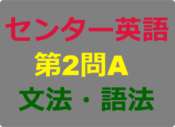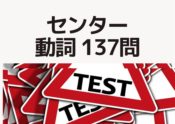センター試験 英語「時制」の過去問を一気に15問

大手予備校で中1から高3の基礎クラスから東大クラスまでほとんどのクラスを担当しました。映像授業にも多数出演経験あり。
元東海大非常勤講師。
「大学入試英語解く得!」は最高PV数 34,212 / 日
質・量ともに日本一分かりやすい大学入試英語対策ページを目指します!
資格:英検一級、通訳案内士(英語)、TOEIC950点
趣味:海外旅行、食べ歩き
特技:将棋アマ六段 (全国レーティング選手権優勝 1998)
元技術翻訳者、元富士通
センターの過去問を分野別に一気に解くシリーズ。
今回は超頻出の時制の過去問です。
時制に自信がない人はこちらの記事を読んでから解きましょう。
1 センターに出た時制 (2000-2018)
1 Nicole ( ) novels for about seven years when she won the national novel contest.
①had been writing ②has been writing ③has written ④is writing
(2018本試験)
2 The train ( ) when I reached the platform, so I didn’t have to wait in the cold.
①had already arrived ②has already arrived ③previously arrived ④previously arrive
(2016本試験)
3 Ever since they first met at the sports festival, Pat and Pam ( ) each other.
①are emailing ②emailed ③have been emailing ④will email
(2014本試験)
4 Robert can’t leave the meeting now because an important plan ( ) discussed.
①had been ②is ③is being ④was
(2014追試験)
5 Eric friends, Minoru and Sachiko, will be here at seven this evening. He ( ) doing his homework by then.
①has been finished ②has finished ③will have finished ④would finish
(2013本試験)
6 “Did you know that Albert Einstein, the famous physicist, ( ) meat?”
“Yes, if my memory serves, he became a strict vegetarian one year before he died.”
①hadn’t stopped eating ②has been stopped from eating ③has stopped eating ④stopped eating
(2009本試験)
7 By the time the 2002 World Cup was held, soccer ( ) already become a leading sport in Japan.
①had ②has ③was ④is
(2004本試験)
8 I still can’t believe that the young man I ( ) at the restaurant was Frankie. He’s grown so much!
①should have seen ②saw ③have been ④might see
(2003本試験)
9 Saki, why don’t you take some time off? You ( ) too hard lately.
①would work ②had worked ③should have worked ④have been working
(2003追試験)
10 Tetsuya didn’t hear the doorbell when his visitors arrived, because he ( ) a shower.
①has been taking ②was taking ③took ④has taken
(2002本試験)
11 “Have you seen Yuko recently?” “No, but ( ) dinner with her on Sunday.”
①I’m having ②I’ve been having ③I’d have ④I’ve had
(2002追試験)
12 We ( ) playing baseball for about half an hour when it started to rain very heavily.
①had been ②have been ③might be ④would be
(2001本試験)
13 I wonder if Stella has lost my number. ( ) her call for the last two hours.
①I’d expected ②I’ll have expected ③I’m expecting ④I’ve been expecting
(2001追試験)
14 “Is that Italian restaurant next to the bookstore new?” “No, I think ( ) for more than a year now.”
①it’s been open ②it’s open ③it’s opened ④it was open
(2000本試験)
15 It’s our wedding anniversary next Tuesday, and by then we ( ) married for ten years.
①are ②will have ③will have been ④would have
(2000追試験)
2 センターに出た時制-解答
1 Nicole ( ) novels for about seven years when she won the national novel contest.
①had been writing ②has been writing ③has written ④is writing
(2018本試験)
2 The train ( ) when I reached the platform, so I didn’t have to wait in the cold.
①had already arrived ②has already arrived ③previously arrived ④previously arrive
(2016本試験)
3 Ever since they first met at the sports festival, Pat and Pam ( ) each other.
①are emailing ②emailed ③have been emailing ④will email
(2014本試験)
4 Robert can’t leave the meeting now because an important plan ( ) discussed.
①had been ②is ③is being ④was
(2014追試験)
5 Eric friends, Minoru and Sachiko, will be here at seven this evening. He ( ) doing his homework by then.
①has been finished ②has finished ③will have finished ④would finish
(2013本試験)
6 “Did you know that Albert Einstein, the famous physicist, ( ) meat?”
“Yes, if my memory serves, he became a strict vegetarian one year before he died.”
①hadn’t stopped eating ②has been stopped from eating ③has stopped eating ④stopped eating
(2009本試験)
7 By the time the 2002 World Cup was held, soccer ( ) already become a leading sport in Japan.
①had ②has ③was ④is
(2004本試験)
8 I still can’t believe that the young man I ( ) at the restaurant was Frankie. He’s grown so much!
①should have seen ②saw ③have been ④might see
(2003本試験)
9 Saki, why don’t you take some time off? You ( ) too hard lately.
①would work ②had worked ③should have worked ④have been working
(2003追試験)
10 Tetsuya didn’t hear the doorbell when his visitors arrived, because he ( ) a shower.
①has been taking ②was taking ③took ④has taken
(2002本試験)
11 “Have you seen Yuko recently?” “No, but ( ) dinner with her on Sunday.”
①I’m having ②I’ve been having ③I’d have ④I’ve had
(2002追試験)
12 We ( ) playing baseball for about half an hour when it started to rain very heavily.
①had been ②have been ③might be ④would be
(2001本試験)
13 I wonder if Stella has lost my number. ( ) her call for the last two hours.
①I’d expected ②I’ll have expected ③I’m expecting ④I’ve been expecting
(2001追試験)
14 “Is that Italian restaurant next to the bookstore new?” “No, I think ( ) for more than a year now.”
①it’s been open ②it’s open ③it’s opened ④it was open
(2000本試験)
15 It’s our wedding anniversary next Tuesday, and by then we ( ) married for ten years.
①are ②will have ③will have been ④would have
(2000追試験)
3 センターに出た時制-解説
3-1 ① – ⑤
1 Nicole ( ) novels for about seven years when she won the national novel contest.
①had been writing ②has been writing ③has written ④is writing
(2018本試験)
小説賞を取った過去よりも、書いていた方が更に前。書くというのは動作なので過去完了進行形を選びます。
ニコルは全国小説コンテストで優秀した時、7年間小説を書いていた。
2 The train ( ) when I reached the platform, so I didn’t have to wait in the cold.
①had already arrived ②has already arrived ③previously arrived ④previously arrive
(2016本試験)
プラットフォームに着いた過去よりも、電車が到着したのは更に前なので過去完了形を選択します。
プラットフォームに着いた時に、電車はすでに到着していたので、寒い中待つ必要はなかった。
3 Ever since they first met at the sports festival, Pat and Pam ( ) each other.
①are emailing ②emailed ③have been emailing ④will email
(2014本試験)
sinceに注目します。sinceが「~以来」という意味で使われる場合、正しくは「~以来今まで」 なので現在完了形と相性が良いです。
ここでも現在完了形、そして電子メールをするのは動作なので現在完了進行形を選びます。
スポーツの祭典で最初に出会ってから、パットとパムはお互いにメールをし合っている。
4 Robert can’t leave the meeting now because an important plan ( ) discussed.
①had been ②is ③is being ④was
(2014追試験)
物が主語なので、受身を選択。時間はnowなので当然時間は現在です。
be being Vp.p. の形は現在進行形の受身の形です。ロバートは重要な計画を検討中なので、今会議を離れることができません。
5 Eric friends, Minoru and Sachiko, will be here at seven this evening. He ( ) doing his homework by then.
①has been finished ②has finished ③will have finished ④would finish
(2013本試験)
by then 「その時までに」ここでのその時は今晩7時です。
未来のある時までに完了する事柄なので未来完了形を選びます。
彼はその時までに宿題を終えているだろう。
3-1 ⑥ – ⑩
6 “Did you know that Albert Einstein, the famous physicist, ( ) meat?”
“Yes, if my memory serves, he became a strict vegetarian one year before he died.”
①hadn’t stopped eating ②has been stopped from eating ③has stopped eating ④stopped eating
(2009本試験)
アインシュタインは歴史上の人物だから過去形を選択します。
内容的にも彼は死ぬ一年前にベジタリアンになったとあるので、肉を食べるのを止めたんですね。
有名な物理学者のアインシュタインが肉を食べるのを止めたのは知っている?
7 By the time the 2002 World Cup was held, soccer ( ) already become a leading sport in Japan.
①had ②has ③was ④is
(2004本試験)
ワールドカップが開かれる過去よりも、サッカーが日本の主要スポーツになった方が過去の事柄なので過去完了形が正解になります。
2002年にサッカーワールドカップが開かれるまでに、サッカーはすでに日本の主要スポーツになっていた。
8 I still can’t believe that the young man I ( ) at the restaurant was Frankie. He’s grown so much!
①should have seen ②saw ③have been ④might see
(2003本試験)
was Frankie とあるので、Frankieに会ったのも過去のはず。素直に過去形を選びます。
レストランであった若者がフランキーだなんてまだ信じられない。
9 Saki, why don’t you take some time off? You ( ) too hard lately.
①would work ②had worked ③should have worked ④have been working
(2003追試験)
lately「最近」はほぼ現在完了形で使われます。最近、ずっと働きすぎなのは動作の継続なので現在完了進行形になります。
サキ、少し安いんだら?最近熱心に仕事しすぎよ。
10 Tetsuya didn’t hear the doorbell when his visitors arrived, because he ( ) a shower.
①has been taking ②was taking ③took ④has taken
(2002本試験)
訪問者が到着した時に、一時的にシャワーを浴びていたので過去進行形を選択します。
whenと過去進行形の組み合わせはよくあるパターンです。
テツヤは訪問客が来た時にシャワーを浴びていたのでドアのベルが聞こえなかった。
3-1 ⑪ – ⑮
11 “Have you seen Yuko recently?” “No, but ( ) dinner with her on Sunday.”
①I’m having ②I’ve been having ③I’d have ④I’ve had
(2002追試験)
「最近ユウコにあった」「いや、でも日曜日に彼女と夕食を食べる」とあるので、日曜日は未来のはず。近い未来を表す現在進行形を選択します。
「最近ユウコにあった」「いや、でも日曜日に彼女と夕食を食べるつもりよ」
12 We ( ) playing baseball for about half an hour when it started to rain very heavily.
①had been ②have been ③might be ④would be
(2001本試験)
雨が降り出した過去よりも更に前に30分野球をしていたとあるので、過去完了進行形を選びます。
雨が強く降り出した時に、私達は30分野球をしていた。
13 I wonder if Stella has lost my number. ( ) her call for the last two hours.
①I’d expected ②I’ll have expected ③I’m expecting ④I’ve been expecting
(2001追試験)
最初の文から基本的な時間は現在。そして この二時間彼女の電話を待っているとあるので、現在までの動作の継続で現在完了進行形を選びます。
この2時間彼女の電話を待っている。
14 “Is that Italian restaurant next to the bookstore new?” “No, I think ( ) for more than a year now.”
①it’s been open ②it’s open ③it’s opened ④it was open
(2000本試験)
新しいレストランではなく、今まで一年以上営業しているので現在完了形を選びます。
it’s はit has の略。ここでのopenは動詞ではなく、形容詞です。
それ (そのイタリアンレストラン)は一年以上営業していると思うよ。
15 It’s our wedding anniversary next Tuesday, and by then we ( ) married for ten years.
①are ②will have ③will have been ④would have
(2000追試験)
next Tuesday とby thenに注目。次の火曜という未来で結婚10週年なので未来完了形を選びます。
来週の火曜日は私達の結婚記念日だ。それまでには10年結婚していることになる。
ほぼこちら↑で説明した内容で解けることを実感してもらえたかと思います。間違えたところは、もう一度説明を読んだ上でよく復習しておきましょう。
大手予備校で中1から高3の基礎クラスから東大クラスまでほとんどのクラスを担当しました。映像授業にも多数出演経験あり。
元東海大非常勤講師。
「大学入試英語解く得!」は最高PV数 34,212 / 日
質・量ともに日本一分かりやすい大学入試英語対策ページを目指します!
資格:英検一級、通訳案内士(英語)、TOEIC950点
趣味:海外旅行、食べ歩き
特技:将棋アマ六段 (全国レーティング選手権優勝 1998)
元技術翻訳者、元富士通








Comment
問14の答えは It has been openではありませんか?
Openが形容詞だとすると。。。
問15 来週の土曜日ではなく火曜日ですよね
自主学習には解説もあり、とても助かります。
ありがとうございます。
大変遅くなり申し訳ございません。ただいま変更しました。ご指摘ありがとうございました。